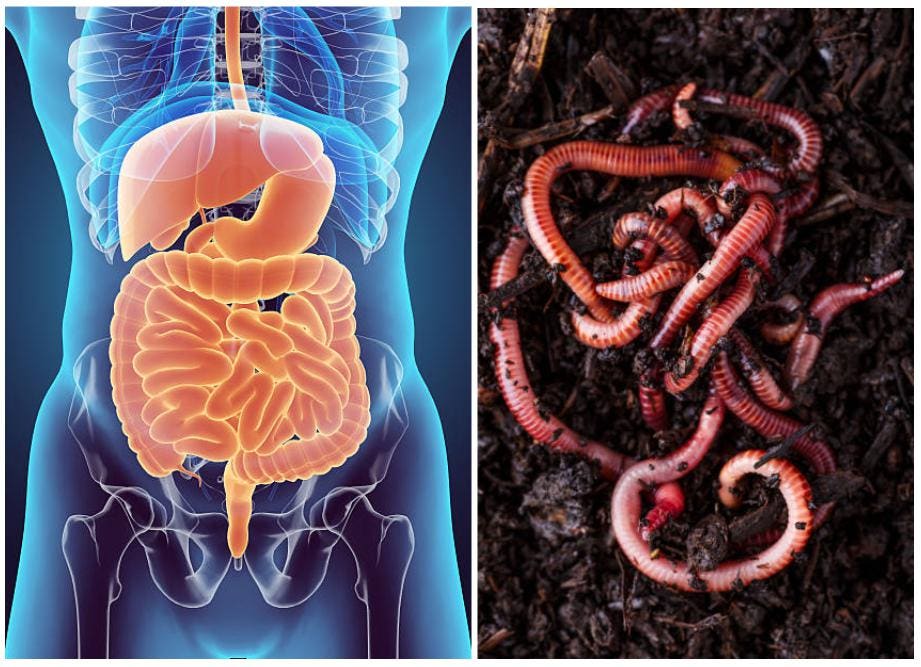It is hard to imagine that millions of years ago, humans and worms derived from a common ancestor. In fact, one study found that we share 70% of our genes with the acorn worm. Although evolution awarded us with appendages and complex sensory systems, the human body, much like a worm, is simply a large tube transporting food from one end to the other. For food to move smoothly through the hollowed organs of the gut, a recent report found that humans, and other similarly evolved species, have an advantage at the cellular level.
Analyzing more than 6,000 human and mouse colon samples, the team from Georgia found that one peculiar molecule was highly expressed in the smooth muscle cells that line the gut. This molecule was not a protein, rather it was a long RNA sequence. To determine the role of this mystery RNA, the team engineered knockout mouse models that no longer had the gene that encoded this RNA.
Despite being born with no physical abnormalities and responding well to their mother’s milk, these mice struggled to gain weight once they transitioned to solid food. Compared to the healthy controls, these mice were much smaller in weight and size. Investigators, however, reported that their abdomens appeared very swollen. A closer examination revealed that the genetically altered mice were severely constipated. A backload of feces and gas had stretched out the colon so much that the now thinned layer of smooth muscle could no longer function properly. Not surprisingly, approximately 60% of these mice died within a week, while the remaining did not make it past 15 months.
What was so special about this RNA and why did removing it cause so much damage? The RNA molecule was a non-coding RNA. Unlike other types of RNA, non-coding RNAs do not encode proteins. Nonetheless, these molecules have diverse functions throughout the cell. Short non-coding RNAs, such as transfer RNA (tRNA) and ribosomal RNA (tRNA), have long been established for mediating the translation of genetic material into proteins. We know much less, however, about long non-coding RNAs. Consisting of at least 200 nucleotides and often many more, the presence of long non-coding RNAs in the cytoplasm seems to regulate several key intracellular functions, including homeostasis, molecular signaling, and metabolism. Emerging studies suggest that these molecules may also enhance or suppress the expression of disease causing genes.
One of the first places long non-coding RNA was detected was in the cardiovascular system. For blood to flow continuously throughout the body, it is important that cardiac muscles have the strength and flexibility to contract. The durability of these cells has been found to correlate with the presence of a special type of long non-coding RNA called cardiac mesoderm enhancer-associated noncoding RNA (CARMN). Animal studies suggest that abnormal expression of CARMN-RNA can increase the risk for developing blood clots and other cardiovascular complications. As the most abundant type of long noncoding RNA in the cardiac cells, CARMN-RNA seems to play a critical role in enhancing the flexibility of blood vessels.
Now, He et. al has found evidence of long noncoding RNAs in another type of vital organ system: the gut. Since the gastrointestinal tract relies on smooth muscles to guide food through the body, it is likely that CARMN-RNA may be at play. In fact, this was the RNA molecule that they initially observed.
To confirm their initial observations, He et. al engineered another mouse model of which were only missing CARMN-RNA in smooth muscle tissues. Much like the previous cohort, these mice were also considerably underweight and developed dangerously enlarged abdomens. The smooth muscle cells lining the gut also exhibited significant degeneration not seen in any other organ. In both CARMN-deficient mice models, investigators found that the time it took for ingested food to travel through the entire gut was considerably longer than in the healthy control group. This confirms that the presence of CARMN-RNA in the gastrointestinal system may be necessary for bowel movement.
He et. al found that the impact of CARMN-RNA deficiency was twofold. First, the lack of CARMN-RNA downregulated the expression of genes that enable smooth muscles to flex and contract. The stiffening of these muscles weakens them over time, such that they can no longer perform properly. Second, researchers were surprised to find increased expression of genes normally recruited to fight inflammation or repair injuries. This was likely due to the tremendous stress caused by large blockages stretching out the intestines.
Although we all rely on it working properly, the gastrointestinal system is usually not something most people enjoy talking about. “You take it for granted but if it’s not [working], you have problems,” says Jiliang Zhou, Ph.D., corresponding author and vascular biologist in the Department of Pharmacology and Toxicology at the Medical College of Georgia. Gut health extends beyond the type of food you put into your body. It also depends on your genes, those that are expressed into proteins and those that are not. The study has only begun to scrape the surface of how long noncoding RNA regulates gut health. Beyond this particular example, increasing evidence suggests that long noncoding RNA comprises a very interesting class of RNA. Even though they may not encode proteins, they can control many of the genes that influence disease.
Read the full article here









